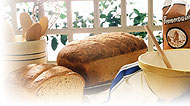Search Healthnotes
Carbohydrate-Loading Diet

Resources for This Diet
Nancy Clark’s Sports Nutrition Guidebook by Nancy Clark, RD. Campaign, IL: Human Kinetics, 1997.
USDA Food and Nutrition Information Center: Fitness, Sports, and Sports Nutrition
www.nal.usda.gov/fnic/etext/000054.html
Sportscience, an interdisciplinary site for research on human physical performance
www.sportsci.org
Bibliography
Ahlborg B, Bergström J, Ekelund LG, Hultman E. Muscle glycogen and muscle electrolytes during prolonged physical exercise. Acta Physiol Scand 1967;70:129–42.
Arnall DA, Nelson AG, Quigley J, et al. Supercompensated glycogen loads persist 5 days in resting trained cyclists. Eur J Appl Physiol 2007;99:251–6.
Bergström J, Hermansen L, Hultman E, Saltin B. Diet, muscle glycogen and physical performance. Acta Physiol Scand 1967;71:140–50.
Coleman E. Carbohydrate unloading: a reality check. The Phys Sportsmed 1997;25:125–9. Online: www.physsportsmed.com/issues/1997/02feb/carbo.htm
Coggan AR, Coyle EF. Effect of carbohydrate feedings during high-intensity exercise. J Appl Physiol 1988;65:1703.
Coggan AR, Coyle EF. Metabolism and performance following carbohydrate ingestion late in exercise. Med Sci Sports Exerc 1989;21:59.
Costill DL. Carbohydrates for exercise: dietary demands for optimal performance. Int J Sports Med 1988;9:1–18.
Coyle EF, Hagberg JM, Hurley BF, et al. Carbohydrate feeding during prolonged strenuous exercise can delay fatigue. J Appl Physiol 1983;55:230–5.
Coyle EF, Coggan AR, Hemmert MK,et al. Muscle glycogen utilization during prolonged strenuous exercise when fed carbohydrate. J Appl Physiol 1986;61:165–72.
Hawley JA, Schabort EG, Noakes TD, et al. Carbohydrate loading and exercise performance. An update. Sports Med 1997;24:73–81.
Hatfield DL, Kraemer WJ, Volek JS, et al. The effects of carbohydrate loading on repetitive jump squat power performance. J Strength Cond Res 2006;20:167–71.
Havemann L, West SJ, Goedecke JH, et al. Fat adaptation followed by carbohydrate loading compromises high-intensity sprint performance. J Appl Physiol 2006;100:194–202.
Ivy JL, Katz AL, Cutler CL, et al. Muscle glycogen synthesis after exercise: effect of time of carbohydrate ingestion. J Appl Physiol 1988;64:1480–5.
Ivy JL, Lee MC, Brozinick JT, et al. Muscle glycogen storage after different amounts of carbohydrate ingestion. J Appl Physiol 1988;65(5):2018–23.
Jacobs KA, Sherman WM. The efficacy of carbohydrate supplementation and chronic high-carbohydrate diets for improving endurance performance. Int J Sport Nutr 1999;9:92–115.
Katch FI, McArdle WD. Introduction to Nutrition, Exercise, and Health, 4th edition. Chapter 10, Optimal nutrition for exercise and good health. Philadelphia, PA: Lea & Febiger, 1993, 149–68.
Reed MJ, Brozinick JT, Lee MC, et al. Muscle glycogen storage postexercise: effect of mode of carbohydrate administration. J Appl Physiol 1989;66:720–6.
Roberts KM, Noble EG, Hayden, DB, et al. Simple and complex carbohydrate-rich diets and muscle glycogen content of marathon runners. Eur J Appl Occup Physiol 1988;57:70–4.
Sherman WM, Peden MC, Wright DA,. Carbohydrate feedings 1 hr before exercise improves cycling performance. Am J Clin Nutr 1991;54:866–70.
Sherman WM, Costill DL, Fink WJ, et al. Effect of exercise-diet manipulation on muscle glycogen and its subsequent utilization during performance. Int J Sports Med 1981;2:114–8.
Sherman WM, Brodowicz G, Wright DA, et al. Effects of 4 h preexercise carbohydrate feedings on cycling performance. Med Sci Sports Exer 1989;12:598–604.
Sherman WM, Wimer, GS. Insufficient dietary carbohydrate during training: does it impair performance? Int J Sports Nutr 1991;1:28–44.
Walberg-Rankin J. Dietary carbohydrate as an ergogenic aid for prolonged and brief competitions in sport. Int J Sport Nutr 1995;5:S13–38 [review].
Whitley HA, Humphreys SM, Campbell,et al. Metabolic and performance responses during endurance exercise after high-fat and high-carbohydrate meals. J Appl Physiol 1998;85:418–24.
Copyright © 2024 TraceGains, Inc. All rights reserved.
Learn more about TraceGains, the company.
The information presented by TraceGains is for informational purposes only. It is based on scientific studies (human, animal, or in vitro), clinical experience, or traditional usage as cited in each article. The results reported may not necessarily occur in all individuals. Self-treatment is not recommended for life-threatening conditions that require medical treatment under a doctor's care. For many of the conditions discussed, treatment with prescription or over the counter medication is also available. Consult your doctor, practitioner, and/or pharmacist for any health problem and before using any supplements or before making any changes in prescribed medications. Information expires December 2024.











